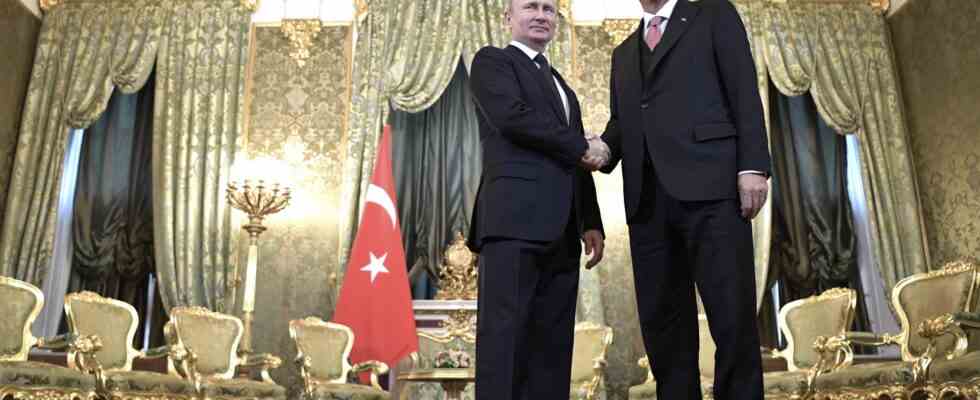Status: 05.11.2022 07:34
International sanctions – there is no sign of this in the booming trade between Turkey and Russia. Are trade restrictions circumvented in this way? A paper that Turkey keeps under lock and key calls the EU into action.
At the beginning of August in the Russian Black Sea city of Sochi: Vladimir Putin and Recep Tayyip Erdogan sit with their legs apart in front of their national flags and decide that the future currency for business between Russia and Turkey will be the ruble. On the fringes of the meeting, they had the Turkish Trade Minister and the Russian Deputy Prime Minister sign a declaration of intent with a roadmap for expanding economic relations.
Since then, the leadership of the European Union has been alarmed, because Ankara does not want to reveal to Brussels what the agreement actually means, EU circles told the ARD. After returning to Turkey, Erdogan added that the aim was to increase the volume of trade with Russia to 100 billion US dollars.
In comparison, the trade volume of the EU and Turkey in 2020 was 132.4 billion euros. Despite the Russian war of aggression against Ukraine and despite the Western sanctions against Putin and his accomplices, Erdogan and his Russian counterpart apparently have big plans. The Turkish President seems to be completely ignoring the fact that there is a customs union between Turkey and the EU.
Russian start-up boom
The result can already be seen. 600 Russian companies have been founded within a few months. Russians are currently the number one foreigners in Turkey when it comes to property purchases.
A senior Commission official in Brussels counts to the ARD 600,000 Russians have settled in Turkey in the past few months, goods exports and imports to and from Russia have almost doubled since August, overland transport via Georgia has increased by up to 30 percent.
At the Turkish-Georgian border, the capacities of the customs authorities are so exhausted that Ankara is expanding the customs facilities at the border. There are 80 flights a day between Russia and Turkey.
Only cash flows have not been traced so far. Since the beginning of the war, numerous Turkish business delegations have flown to Russia and apparently initiated all sorts of deals.
Chips through the back door
Russia has a great need for chips and semiconductors that Putin needs for modern weapons. Due to sanctions, it is becoming increasingly difficult for Russia to buy such goods on the world market, the official said.
That is why Russia buys modern refrigerators, washing machines and even milk pumps with integrated chips from countries that do not participate in the sanctions. The armaments industry then slaughters the devices. For example, an order for several 10,000 breast pumps from Turkey is known.
Brussels is also concerned that Russia could have civil aircraft serviced in Turkey. There are numerous airports where aircraft of the Russian airline Aeroflot could land. The aircraft parks of the companies Turkish Airlines and Pegasus should have enough spare parts in stock.
Warning from the USA
In August, the US Treasury Department issued a written warning to Turkish companies not to do business with Russia through the back door. A paragraph has now also been added to the EU sanctions package No. 8, which was passed at the beginning of October, and which is intended to cause headaches for Turkish entrepreneurs.
It states that persons, legal entities or organizations who evade sanctions contribute to the destabilization of Ukraine and can also be sanctioned.
In order to avoid any misunderstandings as to the purpose of this paragraph, EU Commissioner Mairead McGuinness came to Ankara at the beginning of October and met the finance minister, the trade minister and the governor of the central bank. In an interview with the English-language Turkish newspaper “Hürriyet Daily News”, EU Ambassador Nikolaus Meyer-Landrut said the EU had made its concerns clear to the government; this was also the reason for Commissioner McGuinness’s visit.
Turkish uncertainty
There is already a sense of uncertainty in the Turkish economy, the official said. But the Commission now wants to take a closer look at the flow of goods from products containing chips and semiconductors.
The EU representative warned that Turkey must ensure that it does not become a hub for trade with Russia because this could lead to serious damage to its reputation.

